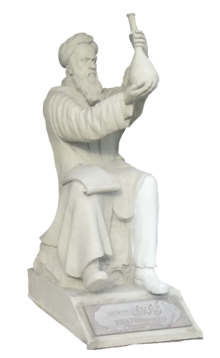แอบู แบกร์ แอล-รอซี (อักษรโรมัน: Abū Bakr al-Rāzī; ชื่อเต็ม: أبو بکر محمد بن زکریاء الرازي, Abū Bakr Muḥammad bin Zakariyyāʾ al-Rāzī)[lower-alpha 1] ป. ค.ศ. 864 หรือ 865–925 หรือ 935,[lower-alpha 2] หรือมักเรียกว่า แอลรอซี หรือชื่อละติน ราซีส (อักษรละติน: Rhazes หรือ Rhasis) เป็นนักศิลปวิทยาการชาวเปอร์เซีย[1] ผู้รู้ด้านแพทยศาสตร์, ปรัชญา และ วิชาเล่นแร่แปลธาตุ มีชีวิตอยู่ในสมัยยุคทองของอิสลาม รอซีได้รับการยอมรับให้เป็นหนึ่งในบุคคลที่มีความสำคัญที่สุดในประวัติศาสตร์การแพทย์[2] นอกจากนี้ยังมีผลงานเชียนในสาขาวิชาตรรกศาสตร์, ดาราศาสตร์ และ ไวยากรณ์[3] และเป็นที่รู้จักจากงานเขียนวิพากษ์ศาสนา โดยเฉพาะในประเด็นการเป็นผู้ส่งสาร และ การเปิดผยบางสิ่งจากพระเจ้าแก่มนุษย์[4]
ข้อมูลเบื้องต้น แอบู แบกร์ แอล-รอซี, เกิด ...
แอบู แบกร์ แอล-รอซี |
|---|
 รูปปั้นของแอลรอซีใน ศาลาปราชญ์ใน เวียนนา |
| เกิด | ค.ศ. 864 หรือ 865
ฮิจเราะห์ศักราช 250 หรือ 251
ราย (อิหร่าน) |
|---|
| เสียชีวิต | 925 (อายุ 60–61) CE or
935 (อายุ 70–71) CE
313 or 323 AH
ราย (อิหร่าน) |
|---|
|
| ยุค | ยุคทองของอิสลาม |
|---|
ความสนใจหลัก | แพทยศาสตร์, ปรัชญา, วิชาแปรธาตุ, การวิจารณ์ศาสนา |
|---|
|
|
ปิด
แอลรอซีเป็นบุคคลแรก ๆ ที่ใช้หลักของการแพทย์เชิงทดลอง รวมถึงยังประกอบวิชาชีพเป็นหัวหน้าแพทย์ทั้งในแบกแดด และใน ราย[5][6] ในฐานะอาจารย์แพทย์ เขายังได้สอนศิษย์จากทุกภูมิหลังและทุกความสนใจ และทุ่มเทให้กับการสอนไม่ว่าศิษย์จะยากดีมีจนเช่นไร[7] ในบรรดาผลงานในสาขาแพทยศาสตร์ของเขา เขาเป็นคนแรกที่ระบุการแยกลักษณะทางคลินิกระหว่างฝีดาษ และ หัด ได้ รวมถึงยังเสนอแนวทางการรักษาฝีดาษไว้เช่นกัน[8]
งานเขียนและแนวคิดทางการแพทย์ของเขาถูกนำไปแปลและกลายมาเป็นที่รู้จักในบรรดาแพทย์ยุคกลางของยุโรป งานของเขามีอิทธิพลมากต่อวงการแพทยศาสตร์ศึกษาของโลกตะวันตกละตินในเวบานั้น[5] บางบทจากงานเขียนเล่ม Al-Mansuri ได้แก่บท "ว่าด้วยศัลยศาสตร์" และ "เล่มทั่วไปสำหรับการรักษา" กลายมาเป็นส่วนหนึ่งของการศึกษาแพทยศาสตร์ในมหาวิทยาลัยของตะวันตก[5] Edward Granville Browne ยกย่องให้เขาเป็น "น่าจะเป็นแพทย์มุสลิมที่ยิ่งใหญ่ที่สุด และเป็นต้นฉบับที่สุด และหนึ่งในนักเขียนที่ผลงานเขียนมีอิทธิพลเยอะที่สุด"[9] นอกจากนี้ เขายังได้รับการเรียกว่าเป็น "บิดาแห่งกุมารเวชศาสตร์"[10][11] รวมถึงยังมีบทบาทมากต่อแพทยศาสตร์ในสาขาสูติศาสตร์ และ จักษุวิทยา[12] หนึ่งในผลงานสำคัญของเขาคือเป็นแพทย์คนแรกที่พบและบรรยายถึงการตอบสนองของรูม่านตาต่อแสงไฟ[11]
For the spelling of his Arabic name, see for example Kraus 1939 harvnb error: no target: CITEREFKraus1939 (help). Sometimes it is also spelled زکریا (Zakariyyā) rather than زکریاء (Zakariyyāʾ), as for example in Dānish-pazhūh 1964, p. 1 of the edition harvnb error: no target: CITEREFDānish-pazhūh1964 (help), or in Mohaghegh 1993, p. 5 harvnb error: no target: CITEREFMohaghegh1993 (help). In modern Persian his name is rendered as ابوبکر محمدبن زکریا رازی (see Dānish-pazhūh 1964, p. 1 of the introduction harvnb error: no target: CITEREFDānish-pazhūh1964 (help)), though instead of زکریا one may also find زکریای (see Mohaghegh 1993, p. 18 harvnb error: no target: CITEREFMohaghegh1993 (help)).
Majid Fakhry, A History of Islamic Philosophy: Third Edition, Columbia University Press (2004), p. 98.
Influence of Islam on World Civilization" by Prof. Z. Ahmed, p. 127.
Rāzī, Abū Bakr Muḥammad ibn Zakarīyā, Fuat Sezgin, Māzin ʻAmāwī, Carl Ehrig-Eggert, and E. Neubauer. Muḥammad ibn Zakarīyāʼ ar-Rāzī (d. 313/925): texts and studies. Frankfurt am Main: Institute for the History of Arabic-Islamic Science at the Johann Wolfgang Goethe University, 1999.
Tschanz David W., PhD (2003). "Arab(?) Roots of European Medicine". Heart Views. 4 (2).
Elgood, Cyril (2010). A Medical History of Persia and The Eastern Caliphate (1st ed.). London: Cambridge. pp. 202–203. ISBN 978-1-108-01588-2. By writing a monograph on 'Diseases in Children' he may also be looked upon as the father of paediatrics.
"Ar-Razi (Rhazes), 864-930 C.E." www.unhas.ac.id. คลังข้อมูลเก่าเก็บจากแหล่งเดิมเมื่อ 20 February 2020. สืบค้นเมื่อ 2020-02-27. Ar-Razi was a pioneer in many areas of medicine and treatment and the health sciences in general. In particular, he was a pioneer in the fields of pediatrics, obstetrics and ophthalmology.
บรรณานุกรม
- Adamson, Peter (2021a). "Abu Bakr al-Razi". ใน Zalta, Edward N. (บ.ก.). The Stanford Encyclopedia of Philosophy.
- Arberry, Arthur John (2008). Revelation and Reason in Islam. Routledge. ISBN 9780415438872.
- Browne, Edward G. (1921). Arabian Medicine, Being the Fitzpatrick Lectures Delivered at the College of Physicians in November 1919 and November 1920. Cambridge: Cambridge University Press. pp. 44–53. OCLC 808169546.
- Dhanani, Alnoor (2013). "Atomism". ใน Fleet, Kate; Krämer, Gudrun; Matringe, Denis; Nawas, John; Rowson, Everett (บ.ก.). Encyclopaedia of Islam, Three. doi:10.1163/1573-3912_ei3_COM_24249.
- Duffin, Jacalyn (2021). History of Medicine: A Scandalously Short Introduction (3rd ed.). University of Toronto Press. ISBN 978-1-4875-0917-0.
- Frye, Richard N. (1975). The Cambridge history of Iran, Volume 4 (Reprint ed.). London: Cambridge University Press. ISBN 978-0-521-20093-6.
- Goodman, L.E (1960–2007). "al-Rāzī". ใน Bearman, P.; Bianquis, Th.; Bosworth, C.E.; van Donzel, E.; Heinrichs, W.P. (บ.ก.). Encyclopaedia of Islam, Second Edition. doi:10.1163/1573-3912_islam_SIM_6267.
- Hitti, Philip Khuri (January 1, 1969). Makers of Arab History. St. Martin's Press.
- Iskandar, Albert Z. (2008). "Al-Rāzī". ใน Selin, Helaine (บ.ก.). Encyclopaedia of the History of Science, Technology, and Medicine in Non-Western Cultures (2nd ed.). Berlin: Springer. pp. 155–156. ISBN 978-1-4020-4559-2.
- Kahl, Oliver (2015). The Sanskrit, Syriac and Persian Sources in the Comprehensive Book of Rhazes. BRILL. ISBN 978-90-04-29024-2.
- Oxford Reference (2022). "Abu Bakr Muhammad ibn Zakariyya al- Razi". Oxford Reference (ภาษาอังกฤษ). สืบค้นเมื่อ 2022-03-03.
- Kraus, Paul; Pines, Shlomo (1913–1936). "al-Rāzī". ใน Houtsma, M. Th.; Arnold, T.W.; Basset, R.; Hartmann, R. (บ.ก.). Encyclopaedia of Islam, First Edition (1913-1936). doi:10.1163/2214-871X_ei1_SIM_3693.
- Walzer, Richard (1962). Greek Into Arabic Essays on Islamic Philosophy (Oriental Studies I ed.). Harvard University Press. ISBN 978-0674362758.
- Richter-Bernburg, Lutz (2003). "Ḥāwi, al-". ใน Yarshater, Ehsan (บ.ก.). Encyclopædia Iranica, Volume XII/1: Harem I–Hedāyat al-mota'allemin. London and New York: Routledge & Kegan Paul. pp. 64–67. ISBN 978-0-933273-74-0.
- Sarton, George (1927). Introduction to the History of Science, Volume 1. ISBN 978-0443092060.
- Stroumsa, Sarah Stroumsa (1999). Freethinkers of Medieval Islam: Ibn al-Rāwandī, Abū Bakr al-Rāzī, and Their Impact on Islamic Thought. Islamic Philosophy, Theology and Science. Texts and Studies. Vol. 35. Leiden: Brill. ISBN 978-90-04-11374-9.
- Ullmann, Manfred (February 1997). Islamic Medicine. Edinburgh University Press. ISBN 9780748609079.
- Walker, Paul E. (1998). "al-Razi, Abu Bakr Muhammad ibn Zakariyya' (d. 925)". ใน Craig, Edward (บ.ก.). Routledge Encyclopedia of Philosophy. doi:10.4324/9780415249126-H043-1. ISBN 9780415250696.
- Ziai, Hossein (2005). "Recent trends in Arabic and Persian philosophy". ใน Adamson, Peter; Taylor, Richard C. (บ.ก.). The Cambridge Companion to Arabic Philosophy. Cambridge: Cambridge University Press. pp. 405–425. ISBN 978-0521520690.
